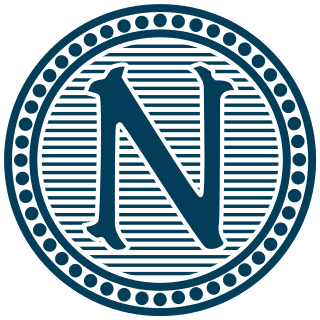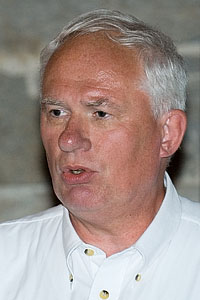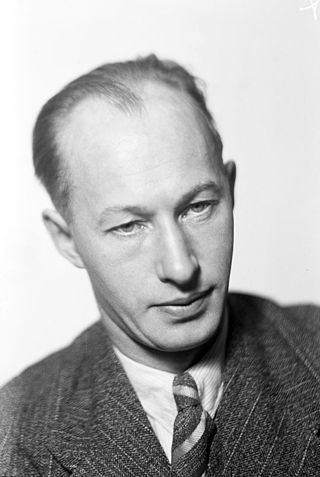
The Royal Swedish Academy of Sciences is one of the royal academies of Sweden. Founded on 2 June 1739, it is an independent, non-governmental scientific organization that takes special responsibility for promoting natural sciences and mathematics and strengthening their influence in society, whilst endeavouring to promote the exchange of ideas between various disciplines.

The Royal Swedish Academy of War Sciences is one of the Royal Academies in Sweden and was founded on 12 November 1796 by Gustaf Wilhelm af Tibell. The academy is an independent organization and a forum for military and defense studies as well as national security issues. Membership is limited to 160 chairs under the age of 62.

Bengt Ingemar Samuelsson was a Swedish biochemist. He shared with Sune K. Bergström and John R. Vane the 1982 Nobel Prize for Physiology or Medicine for discoveries concerning prostaglandins and related substances.

Arne Wilhelm Kaurin Tiselius was a Swedish biochemist who won the Nobel Prize in Chemistry in 1948 "for his research on electrophoresis and adsorption analysis, especially for his discoveries concerning the complex nature of the serum proteins."

Edward Adelbert Doisy was an American biochemist. He received the Nobel Prize in Physiology or Medicine in 1943 with Henrik Dam for their discovery of vitamin K and its chemical structure.

The Nobel Foundation is a private institution founded on 29 June 1900 to manage the finances and administration of the Nobel Prizes. The foundation is based on the last will of Alfred Nobel, the inventor of dynamite.

Gunnar Jahn was a Norwegian jurist, economist, statistician, politician for the Liberal Party and resistance member. He held several important positions, such as Norwegian Minister of Finance and Customs from 1934 to 1935 and in 1945, chair of the Norwegian Nobel Committee from 1941 to 1966 and Governor of the Central Bank of Norway from 1946 to 1954.

The Nobel Committee for Physics is the Nobel Committee responsible for proposing laureates for the Nobel Prize for Physics. The Nobel Committee for Physics is appointed by the Royal Swedish Academy of Sciences. It usually consists of Swedish professors of physics who are members of the Academy, although the Academy in principle could appoint anyone to the Committee.
The International Union of Crystallography (IUCr) is an organisation devoted to the international promotion and coordination of the science of crystallography. The IUCr is a member of the International Council for Science (ICSU).

Geir Lundestad was a Norwegian historian, who until 2014 served as the director of the Norwegian Nobel Institute when Olav Njølstad took over. In this capacity, he also served as the secretary of the Norwegian Nobel Committee. However, he was not a member of the committee itself.

Professor Nils Gunnar Hansson von Heijne, born 10 June 1951 in Gothenburg, is a Swedish scientist working on signal peptides, membrane proteins and bioinformatics at the Stockholm Center for Biomembrane Research at Stockholm University.
The Nobel Committee for Physiology or Medicine is the Nobel Committee responsible for proposing laureates for the Nobel Prize in Physiology or Medicine. The Nobel Committee for Physiology or Medicine is appointed by the Nobel Assembly at the Karolinska Institute, a body of 50 members at Karolinska Institute that is formally a separate body not part of the institute itself. It consists of professors of physiology or medical subjects active at Karolinska Institute. Other than the five ordinary members, ten associated members are appointed each year, for that year only.

The Economic Sciences Prize Committee is the prize committee for the Nobel Memorial Prize in Economic Sciences, and fills the same role as the Nobel Committees do for the Nobel Prizes. This means that the committee is responsible for proposing laureates for the prize. The Committee for the Prize in Economic Sciences in Memory of Alfred Nobel is appointed by the Royal Swedish Academy of Sciences. It usually consists of Swedish professors of economics or related subjects who are members of the academy, although the academy in principle could appoint anyone to the committee. Two of the members of the founding committee as well as later members of the committee had also been associated with the Mont Pelerin Society.
Gustav Arne Ölander was a Swedish chemist, known for his discovery of the shape-memory effect in metal alloys. He was the son of Gustaf Ölander and Hilda Ölander née Norrman.
The Björkén Prize is a scientific award given by Uppsala University. It is awarded for outstanding research in science and the theoretical branches of medicine. The prize was established in 1893 from a donation given by university lecturer John Björkén (1833–1893). Björkén was a physician and medical assistant professor in surgery and obstetrics at Uppsala. The prize was first awarded in 1902 on the day of his death.

Gunnar Hägg was a Swedish chemist and crystallographer.

The 1974 Nobel Prize in Literature was awarded jointly to Swedish authors Eyvind Johnson (1900–1976) "for a narrative art, farseeing in lands and ages, in the service of freedom" and Harry Martinson (1904–1978) "for writings that catch the dewdrop and reflect the cosmos." The winners were announced in October 1974 by Karl Ragnar Gierow, permanent secretary of the Swedish Academy, and later sparked heavy criticisms from the literary world.














